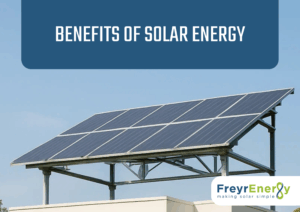As bright as it is, the benefits from sunlight are even brighter. If you are constantly irked by the continuous increase in your power bills, consider solar energy as a greener alternative for your energy needs.
This blog delves deep into understanding how to save electricity using sunlight.
What is solar energy?
Solar energy is the energy in the form of heat and light, received from the sun, which is used to power homes, industries, hospitals, and commercial establishments. Sunlight is captured through solar panels and converted into usable energy. This is a renewable source of energy, free from pollution.
Benefits of solar energy

Reduces electricity bills
The use of solar energy can reduce dependence on the grid and thus bring about a reduction in power bills for households.
Clean energy
It is a form of green energy that does not pollute the environment, unlike conventional sources of energy, which release carbon dioxide.
Abundantly available
Solar energy is renewable, as sunlight is an abundantly available source. It can be used again and again without any fear of running out of availability.
Reduces the carbon footprint
Since solar energy is clean, widespread use of solar systems can help reduce the carbon footprint. Release of harmful gases from the use of fossil fuels is already a big challenge to the environment.
Energy independence
The use of solar energy can create energy independence as it reduces dependence on conventional sources of power.
Net metering benefits
Excess energy generated can either be stored or sent back to the grid, whereby the power companies pay you for energy received. This leads to income generation.
How shifting to solar can bring about electricity savings
Most of our energy needs are met by fossil fuels, which are non-renewable. Due to their limited availability, their indiscriminate use has led to a demand-supply imbalance. This creates price volatility and a sharp increase in energy bills for households and industries.
Also, the use of non-renewable sources of energy releases harmful gases, which disrupts the health of the environment.
Solar energy is abundant in supply and is renewable. It also does not pollute the environment. The use of solar energy can bring about a reduction in dependence on the power grid, which uses conventional means to generate electricity.
Hence, we can see remarkable savings in the electricity bills of households and commercial establishments. Based on the size of the solar system and your consumption habits, you can experience 70-90% savings in bills.
If your spending on energy bills is INR 3000, with a 3kW solar system, you can see it reduce to nearly INR 300.
Steps involved in making your house solar-powered
1. Assess your energy requirements
Consult a solar professional and assess your energy needs. This has to be futuristic, considering any increase in the number of appliances. The monthly electricity consumption will help understand the size of the solar system.
2. Examine the roof space
Rooftop panels require a proper mounting structure and should be free from any obstructions or shading.
3. Understand the government policies
The central and state governments offer various incentives to encourage the shift to solar. Analyse them and also apply for the necessary permits.
4. Net metering
With excess power generated, you can earn by sending it back to the power grid.
5. Install the solar system
Approach a solar professional company to install your solar system.
6. Battery storage
Create a battery storage facility to store excess power generated that can be used during outages.
7. Monitor performance
Ensure regular solar panel maintenance and monitor the performance of your solar system to improve its longevity.
How does solar energy reduce dependence on conventional sources of power?
We can see a gradual shift from conventional sources of power, with repeated emphasis from the government and the incentives issued.
When more households and industries shift to solar power, they develop self-sufficiency in their energy needs. This helps reduce dependence on fossil fuels. Solar energy can be used for heating, lighting, charging EVs, cooking, building heating, powering agricultural equipment, and more. Traditional power sources are used majorly for these purposes only, and can be easily replaced by solar.
Conclusion
Solar panels have a long life span of up to 25 years when maintained regularly. You can start to realise a return from solar within 5-10 years. This indicates the long-term benefits of solar energy and how good an investment it is.
Sunlight can thus be converted into savings with solar systems. With the continuous increase in electricity costs, it is imperative that a major portion of the population consider a quick shift to solar energy.
